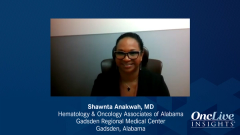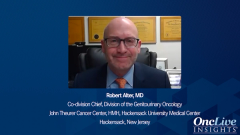
Patient Profile Presentation: A 61-Year-Old Man with Advanced Renal Cell Carcinoma
Eric Jonasch, MD, presents a real world advanced renal cell carcinoma patient profile and reviews the available first-line IO-TKI combination treatment regimens.
Episodes in this series

Eric Jonasch, MD: Hello, and welcome to this OncLive® My Treatment Approach program titled “Improving Outcomes in Advanced Renal Cell Carcinoma: Translating Evidence to Clinical Practice.” I’m Eric Jonasch, a professor in the department of genitourinary medical oncology, in the division of cancer medicine, The University of Texas MD Anderson Cancer Center in Houston, Texas. I’m joined by my colleague Dr Sumeet Bhatia. I’d like to ask Dr Bhatia to introduce himself.
Sumeet Bhatia, MD: I’m Sumeet Bhatia. I’m a medical oncologist in Indianapolis, Indiana. I’m part of the MD Anderson Physicians Network. I’ve been practicing in the community for 22 years.
Eric Jonasch, MD: Thank you for joining me. We’re going to discuss recent advances in the treatment of advanced renal cell carcinoma and their impact on clinical practice. We’ll present 2 real-world cases and discuss our treatment approach to illustrate how we incorporate clinical data into our practice. Let’s get started with our first topic: a 61-year-old man who initially presented with a 9-month history of a 35-lb weight loss and right upper-quadrant discomfort. Abdominal imaging revealed a 15 sonometer right renal mass. Chest imaging did not reveal any evidence of metastatic disease.
He underwent right radical nephrectomy revealing an 18-cm pT2 N2 renal cell carcinoma with 10% sarcomatoid features. Six months later, restaging scans revealed enlarging, multifocal, bilateral lung nodules in multiple lymph nodes in the mediastinum as well as a few retroperitoneal nodules. He started on lenvatinib 20 mg by mouth daily and pembrolizumab 200 mg IV [intravenously] every 3 weeks. He tolerated treatment moderately well, with 2 to 4 episodes of loose stool per day and some moderated fatigue. The fatigue worsens, and he undergoes a dose reduction to lenvatinib 14 mg by mouth per day with a significant improvement in his quality of life. Repeat imaging studies at 12 weeks show a significant decrease in his disease burden with a partial response. He continues therapy. Scans at 24 weeks show continued improvement in his disease burden.
At the following cycle, he presents for immunotherapy clearance and complains of quick-onset severe fatigue and generalized body aches and is found to be moderately hypotensive. We immediately admitted him, and his work-up revealed low cortisol but a normal ACTH and normal posterior pituitary hormones. He started on stress steroids, quickly tapered to oral hydrocortisone replacement therapy, and is discharged home. This was clear evidence of adrenal insufficiency, but it wasn’t because of dysfunction of the posterior pituitary. After 12 months of therapy, he demonstrates a complete response [CR]. We had a discussion with this patient, and a decision was made to continue treatment with lenvatinib 14 mg by mouth daily and pembrolizumab 200 mg IV every 3 weeks. A year later the patient returns to the clinic, and the scans show a continued complete response.
We’re going to quickly summarize some of the first-line I/O [immuno-oncology]–TKI [tyrosine kinase inhibitor] combination regimens that have been approved for patients with advanced renal cell carcinoma. There have been 3 agents approved that have demonstrated an overall survival [OS] advantage. The first regimen was axitinib and pembrolizumab, which was FDA approved in 2019 based on a study demonstrating a progression-free survival [PFS] advantage for axitinib and pembrolizumab compared with sunitinib. These are all individuals who had clear cell renal cell carcinoma, no prior systemic therapy, and measurable disease. It also demonstrated an objective response rate advantage and an overall survival advantage for axitinib and pembrolizumab relatively early on. There were updated data with a 43-month follow-up presented at ASCO [American Society of Clinical Oncology Annual Meeting] in 2021, demonstrating a persistence benefit with an overall survival advantage; a hazard ratio of 0.73, which remains statistically significant; and a continued benefit from a PFS perspective and an objective response rate perspective.
Slightly more recently, in 2021, the combination of cabazantinib and nivolumab was FDA approved as well. This was about a 650-patient study randomizing pretty much the same type of patients: previously untreated clear cell renal cell carcinoma, measurable disease. Between cabozantinib-nivolumab, cabazantinib had 40 mg and nivolumab at the standard dose vs sunitinib with primary end point of progression-free survival. There was a doubling of progression-free survival in this study from 8.3 to 16.6 months. Initially there was a positive hazard ratio for overall survival, of 0.60, and the regimen was well tolerated. Objective response rates were in the high 50% range for the combination vs the 20% range for sunitinib.
The most recent approval was for lenvatinib and pembrolizumab. This was approved in August 2021. This was a 3-arm study, lenvatinib and pembrolizumab, the lenvatinib at 20 mg and pembrolizumab every 3 weeks at 200 mg IV vs lenvatinib and everolimus vs sunitinib. The primary end point was progression-free survival. It met its primary end point of PFS, 24 months vs 9 months for the lenvatinib-pembrolizumab combination, and OS, with a positive hazard ratio and a response rate of 71% for the combination vs the mid-30% range for sunitinib and a CR rate of 16%. Interestingly, however, there was a dose reduction in a significant percentage of patients. Thirteen percent of patients had discontinuation of both regimens vs similar numbers for axitinib and pembrolizumab and single digits for cabozanatinib.
That’s a quick summary of what has revolutionized the field and the treatment of advanced clear cell renal cell carcinoma.
Transcript edited for clarity.








































